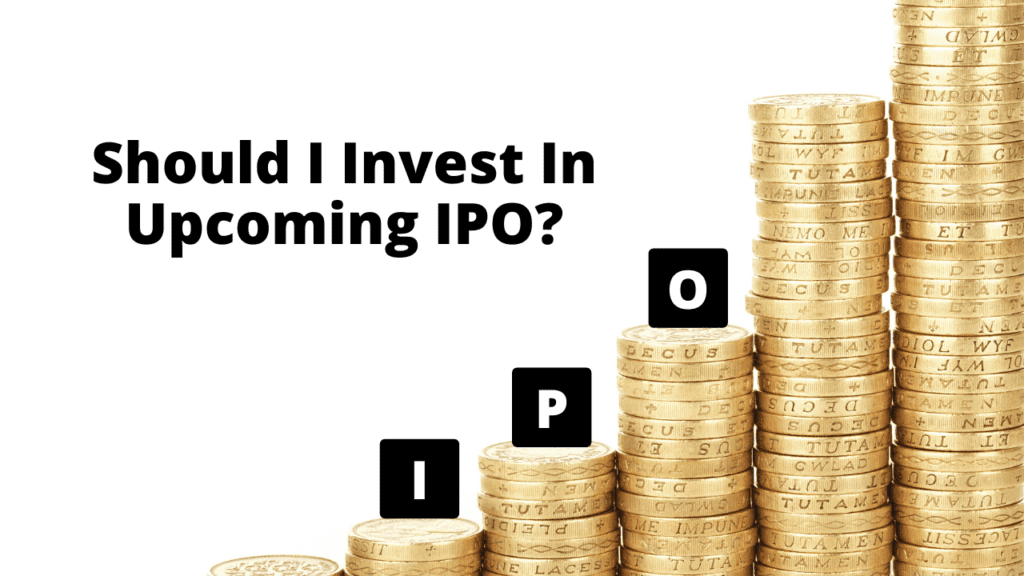Should I invest in the upcoming IPOs?

Should I invest in the upcoming IPOs?

I. Introduction
Invest in the upcoming IPOs. An initial public offering (IPO) is the first time a private company offers shares of its stock to the public, which allows the company to raise capital from a wide range of investors. IPOs can be a significant milestone for a company, as it can provide access to new funding, increase visibility and brand recognition, and potentially provide liquidity to early investors and employees. invest in the upcoming IPOs.
invest in the upcoming IPOs. IPOs are often seen as an important event in the financial markets, as they can generate significant media attention and investor interest. Investors are often eager to participate in IPOs as they present an opportunity to invest in a company’s growth potential from its early stages. Successful IPOs can also indicate a healthy market for initial offerings, and can boost confidence in the overall economy.
The purpose of this article is to explore the question of whether or not one should invest in upcoming IPOs. We will examine the benefits and drawbacks of IPOs, the factors to consider before investing, how to invest in an IPO, and the risks and rewards associated with investing in IPOs. By the end of the article, readers will have a better understanding of the IPO process and be better equipped to make informed investment decisions. invest in the upcoming IPOs.
II. What is an IPO?
An IPO, or initial public offering, is the process by which a private company becomes a publicly-traded company by selling its shares to the general public for the first time. The purpose of an IPO is to raise capital for the company and provide liquidity to early investors and employees who may want to sell their shares. invest in the upcoming IPOs.
Advantages of IPOs:
- IPOs can provide a company with a significant amount of capital to fund growth and expansion opportunities.
- Going public can increase a company’s visibility and brand recognition, which can attract new customers, partners, and investors.
- Early investors and employees can sell their shares in the public market, providing them with liquidity and potentially realizing a profit.
- Offering stock options or equity can be a valuable incentive for employees and help attract and retain top talent.
- Going public can establish a market value for the company, which can be helpful for future fundraising or acquisition opportunities. invest in the upcoming IPOs.
Disadvantages of IPOs:
- Costs: The costs of going public can be significant, including legal, accounting, and underwriting fees.
- Disclosure requirements: Public companies are required to disclose detailed financial and operational information, which can be time-consuming and costly to prepare and can potentially expose the company to increased scrutiny. invest in the upcoming IPOs.
- Loss of control: Going public can dilute the ownership of existing shareholders and give them less control over the company’s operations and strategic decisions.
- Short-term pressure: Public companies may face pressure to meet quarterly earnings expectations, which can lead to short-term thinking and decisions that may not be in the best interest of the long-term health of the company.
- Market volatility: Public companies are subject to market fluctuations and investor sentiment, which can cause significant swings in the stock price and impact the company’s valuation.
III. Why do companies go public?
There are several reasons why a company may choose to go public, invest in the upcoming IPOs including:
- One of the primary reasons companies go public is to raise capital to fund growth and expansion opportunities. Going public can provide access to a much larger pool of potential investors and can help to raise significant amounts of capital.
- Going public can provide liquidity to early investors and employees who may want to sell their shares. This can help to attract and retain top talent and can provide a way for early investors to realize a return on their investment.
- Going public can increase a company’s visibility and brand recognition, which can help to attract new customers, partners, and investors.
- Publicly-traded companies may have a higher valuation than private companies, which can make their shares an attractive currency for use in acquiring other companies.
- Going public can provide a more formal structure for investor relations, which can help to build credibility and trust with investors and stakeholders.
The benefits of going public:
- Going public can provide a company with a significant amount of capital to fund growth and expansion opportunities.
- Going public can increase a company’s visibility and brand recognition, which can attract new customers, partners, and investors.
- Going public can provide liquidity to early investors and employees who may want to sell their shares.
- Offering stock options or equity can be a valuable incentive for employees and help attract and retain top talent.
- Going public can establish a market value for the company, which can be helpful for future fundraising or acquisition opportunities.
The drawbacks of going public:
- The costs of going public can be significant, including legal, accounting, and underwriting fees.
- Public companies are required to disclose detailed financial and operational information, which can be time-consuming and costly to prepare and can potentially expose the company to increased scrutiny.
- Going public can dilute the ownership of existing shareholders and give them less control over the company’s operations and strategic decisions.
- Public companies may face pressure to meet quarterly earnings expectations, which can lead to short-term thinking and decisions that may not be in the best interest of the long-term health of the company.
- Public companies are subject to market fluctuations and investor sentiment, which can cause significant swings in the stock price and impact the company’s valuation.
IV. Factors to consider before investing in an IPO
Before investing in an IPO, it’s important to consider the company’s fundamentals, including its financial performance, competitive position, and growth prospects. Key metrics to consider may include revenue growth, profit margins, market share, and customer retention rates. It’s also important to evaluate the company’s business model and assess whether it is sustainable and scalable over the long term.
The quality and experience of a company’s management team can have a significant impact on its success. Before investing in an IPO, it’s important to research the background and track record of the company’s leadership team, including the CEO, CFO, and board of directors. Key considerations may include their industry experience, leadership style, and ability to execute on the company’s strategic vision.
Invest in the upcoming IPOs. It’s important to evaluate the market and industry trends that may impact the company’s performance and growth prospects. Key factors to consider may include changes in consumer behavior, emerging technologies, and regulatory developments. It’s also important to evaluate the competitive landscape and assess whether the company has a sustainable competitive advantage.
It’s important to evaluate the valuation of the company before investing in an IPO. This involves assessing the company’s financial metrics, such as revenue, earnings, and cash flow, and comparing them to industry peers and benchmarks. It’s also important to evaluate the company’s growth prospects and assess whether the valuation is reasonable given the company’s potential for future growth.
Invest in the upcoming IPOs. Before investing in an IPO, it’s important to evaluate any legal or regulatory issues that may impact the company’s operations or growth prospects. Key considerations may include pending litigation, regulatory approvals, and compliance with relevant laws and regulations. It’s also important to evaluate the company’s corporate governance practices and assess whether they align with best practices and investor expectations.
V. How to invest in an IPO
The traditional IPO process involves a company issuing new shares to the public through an underwriting process. The underwriter acts as an intermediary between the company and investors, helping to set the price of the shares and distributing them to the public. To invest in a traditional IPO, investors typically need to work with a brokerage firm that has access to the underwriting syndicate.
invest in the upcoming IPOs. In a direct listing, a company lists its shares on a stock exchange without issuing new shares or raising additional capital. Instead, existing shareholders, such as early investors and employees, are able to sell their shares directly to the public. To invest in a direct listing, investors typically need to work with a brokerage firm that has access to the stock exchange where the shares are listed.
Invest in the upcoming IPOs. Special Purpose Acquisition Companies (SPACs) are a type of investment vehicle that raise capital through an IPO with the intention of using the proceeds to acquire another company. SPACs have become increasingly popular in recent years, as they provide a faster and more flexible path to going public. To invest in a SPAC, investors can purchase shares through a brokerage firm just like they would with a traditional IPO.
invest in the upcoming IPOs When investing in an IPO, it’s important to have a clear strategy and a long-term perspective. invest in the upcoming IPOs. Some strategies that investors may consider include:
- Before investing in an IPO, it’s important to conduct thorough research on the company and its industry. This may involve reviewing the company’s financial statements, evaluating its growth prospects, and assessing its competitive position.
- Investors should carefully evaluate the offering price of the shares and assess whether it is reasonable given the company’s financial metrics and growth prospects.
- Investing in IPOs can be risky, so it’s important to diversify your portfolio and not put all your eggs in one basket.
- IPOs can be volatile in the short-term, so it’s important to have a long-term perspective and not get caught up in short-term fluctuations in the stock price. invest in the upcoming IPOs.
- Investing in IPOs can be risky, so it’s important to assess your risk tolerance and invest accordingly. It’s important to remember that no investment is risk-free and that you may lose money on your investment.
VI. Risks and rewards of investing in IPOs
invest in the upcoming IPOs. Investing in IPOs can be risky, and investors should carefully evaluate the potential risks before investing. Some potential risks of investing in IPOs include:
- IPOs can be highly volatile in the short-term, and investors may experience significant fluctuations in the stock price.
- IPOs typically have limited historical data available, making it difficult to assess the company’s financial performance and growth prospects.
- Many IPOs have lock-up periods, which prevent insiders and early investors from selling their shares for a period of time after the IPO. This can create selling pressure once the lock-up period expires, which can negatively impact the stock price. invest in the upcoming IPOs.
- Some IPOs may be overhyped, leading to inflated valuations that are not sustainable over the long-term.
- Companies going public may be subject to regulatory and legal risks, such as lawsuits or regulatory sanctions, that could impact their financial performance.
Invest in the upcoming IPOs. Despite the potential risks, investing in IPOs can also offer significant rewards for investors who are able to identify high-quality companies with strong growth prospects. Some potential rewards of investing in IPOs include:
- IPOs can provide investors with the opportunity to invest in high-growth companies before they become widely known.
- If a company is successful, investors in the IPO may see significant returns on their investment.
- Investing in IPOs can provide investors with exposure to a wide range of industries and sectors, helping to diversify their portfolio.
- Once a company goes public, its shares are available for trading on the stock exchange, providing investors with liquidity and the ability to sell their shares if needed.
There have been many successful IPOs over the years, including companies like Amazon, Google, and Facebook, which have gone on to become some of the most valuable companies in the world. However, there have also been many unsuccessful IPOs, such as We Work and Blue Apron, which have seen their stock prices plummet in the months following their IPOs. It’s important to remember that investing in IPOs can be risky, and that past performance is not necessarily indicative of future results. invest in the upcoming IPOs.
VII. Conclusion
In summary, an IPO is the process by which a private company goes public and offers its shares to the general public for the first time. IPOs can offer significant rewards for investors who are able to identify high-quality companies with strong growth prospects, but they can also be highly volatile and come with significant risks. Before investing in an IPO, investors should carefully evaluate the company’s fundamentals, management and leadership, market and industry trends, valuation, and legal and regulatory issues.
Investing in IPOs can be a good way to diversify your portfolio and potentially earn significant returns, but it’s important to do your research and understand the risks involved. It’s also important to have a long-term investment horizon, as IPOs can be highly volatile in the short-term. Investors who are not comfortable with the risks involved may want to consider investing in more established companies that have a proven track record of success.
Should I invest in the upcoming IPOs?
Invest in the upcoming IPOs. The future outlook for IPOs is difficult to predict, as it will depend on a wide range of factors, including market conditions, regulatory changes, and macroeconomic trends. However, it’s likely that the IPO market will continue to be an important source of capital for companies looking to grow and expand, and that investors will continue to be interested in investing in high-growth companies with strong fundamentals. As always, investors should remain vigilant and carefully evaluate the risks and rewards of any investment opportunity before making a decision. Invest in the upcoming IPOs.



